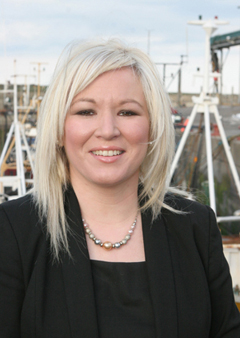Agriculture Minister Michelle O’Neill today launched three important consultations.
The consultations are: Options for Future Support to Areas of Natural Constraint; Designation of Areas of Natural Constraint, and; A Review of CAP Coupled Support Options.

The current support scheme for Areas of Natural Constraint (ANC) forms part of the Rural Development Programme, providing a payment to farmers in the severely disadvantaged area to compensate in part for the additional costs incurred and income forgone related to the constraints on agricultural production in the area. The Scheme is programmed to operate for two years only – in 2016 and 2017 (for claims made in 2015 and 2016). The consultation launched today presents options for future support to those farming in these areas after the 2016/17 year.
The consultation on the Designation of Areas of Natural Constraint reflects the fact that the EU Rural Development Regulation requires the Department to replace the current Less Favoured Areas designation with an Areas of Natural Constraint designation based on new set of criteria. The Department is in the process of carrying out the work involved in re-designation and is seeking views on the approach to creating these new maps.
The third policy area on which DARD is seeking views is CAP coupled support. Pillar I of the EU Common Agricultural Policy (CAP), which deals with Direct Payments to farmers, permits the option of introducing coupled support i.e. a payment directly linked to the volume of output of a specific agricultural product. Coupled support is not currently implemented here. Stakeholders are invited to give their views on whether a coupled support scheme should be introduced.
Minister O’Neill said: “The Areas of Natural Constraint Scheme has provided support for those farming in Severely Disadvantaged Areas. It is important to look ahead and consider our options for any potential future support to these areas within the framework of CAP and to consider in tandem the initial ANC maps based on the requirements of the EU legislation and guidance.
“In June 2014, as part of the CAP Reform decisions, I announced that a coupled support scheme would not be introduced but that this position would be kept under review. Stakeholders now have the opportunity to give their views on CAP coupled support so that the 2014 decision can be re-examined in light of evolving circumstances.
“These three consultations could result in changes to the architecture of the CAP support regime in the 2017-2020 period which would have to be notified to the EU Commission. I would, therefore, encourage all those with an interest to read the consultation documents and to forward their views by no later than 29 April 2016.”

























